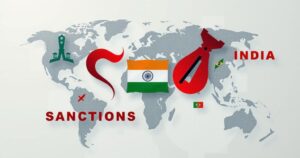Trump to Engage in Talks with Putin and Zelenskyy on Ukraine Conflict

Donald Trump plans to speak with both Vladimir Putin and Volodymyr Zelenskyy to discuss ending the Ukraine conflict, which he describes as a ‘bloodbath.’ His efforts come amid skepticism about their potential effectiveness. Concurrently, Trump faces scrutiny over accepting a luxury jet, while economic concerns rise following a downgrade of the US credit rating.
Donald Trump is set to engage in discussions with both Russian President Vladimir Putin and Ukrainian President Volodymyr Zelenskyy, hoping to ease the ongoing conflict in Ukraine. Trump announced this intent on Truth Social, pinpointing a call with Putin for Monday morning. He referred to the ongoing situation as a “bloodbath,” claiming that over 5000 soldiers from both sides are falling each week. However, many experts find Trump’s cited figures to be substantially higher than officially available data.
The Kremlin confirmed that preparations for the call with Trump are being made, according to Kremlin spokesperson Dmitry Peskov. Following the conversation with Putin, Trump is expected to speak with Zelenskyy, as well as NATO leaders, reflecting a broader US initiative aimed at halting the war, which has persisted since Russia’s invasion in 2022. Trump expressed hope through his posts, stating, “HOPEFULLY IT WILL BE A PRODUCTIVE DAY, A CEASEFIRE WILL TAKE PLACE, AND THIS VERY VIOLENT WAR, A WAR THAT SHOULD HAVE NEVER HAPPENED, WILL END.”
However, the likelihood of achieving any concrete advancements during these discussions remains uncertain. Previous peace talks held recently in Istanbul yielded limited results. Ukraine indicated that while they are open to a ceasefire, they have been met with demands from Russia that they deemed unacceptable. The ongoing cycle of negotiation and conflict leaves many questioning Trump’s potential impact on peace efforts.
In unrelated news, Trump’s acceptance of a $400 million jet from Qatar has sparked allegations of corruption. Democratic Senator Chris Murphy criticized the “flying grift” during an NBC interview, referring to Trump’s recent trip to various Gulf states, including Qatar, which raised eyebrows among both Democrats and Republicans.
In the legal realm, as Trump verbally attacks a range of law firms and the justice department, some lawyers are opting to start their own practices as a response. This trend comes amid an environment where the judiciary is increasingly seen as an influential counterbalance to the Trump administration’s policies.
Furthermore, facing pressure from Trump’s directive, Walmart has announced it will absorb some costs related to tariffs imposed by the administration. The company’s CEO assured Treasury Secretary Scott Bessent of their commitment, even as Walmart prepares to increase consumer prices due to these financial pressures.
Amid shifting economic realities, a proposed rule change could enable the dismissal of civil servants classified as obstructing presidential directives, which could threaten the integrity of the statistical data produced by the government.
In health-related news, former President Joe Biden has reportedly been diagnosed with an aggressive form of prostate cancer that has metastasized to his bones, prompting serious consideration of treatment options for him and his family. Trump has also expressed his concern regarding Biden’s health.
Lastly, issues surrounding US government debt could escalate this week as Moody’s has downgraded the US credit rating from its esteemed triple-A status, adding to the administration’s challenges as economists warn about a potential recession triggered by recent tariffs.
In summary, Donald Trump’s upcoming discussions with Putin and Zelenskyy aim to address the ongoing conflict in Ukraine, though skepticism remains regarding their efficacy. Corruption allegations surrounding Trump’s acceptance of a luxury jet gift, Walmart’s response to tariffs, and Biden’s cancer diagnosis mark key developments in US politics. Furthermore, a major downgrade in US credit rating may add pressure to the already fragile economic landscape.
Original Source: www.theguardian.com





